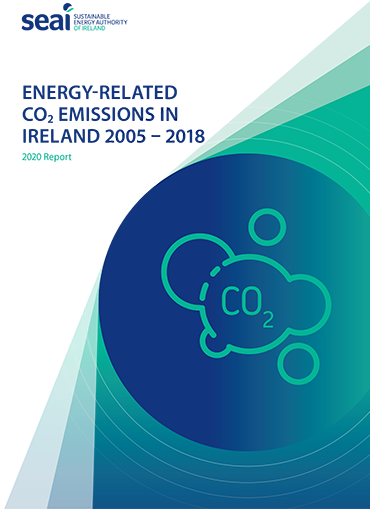CO₂ emissions report
Key findings
The report shows that energy-related CO₂ emissions declined slightly in 2018, even as energy use increased. This was due to changes in the mix of fuels used, particularly for electricity generation, where more renewable energy and less coal was used. CO₂ emissions from travel and heating our homes and businesses increased again in 2018.
Transport
Transport was responsible for the largest share of energy-related CO₂ emissions in 2018 at 40%, up from 33% in 2005. Transport remains almost entirely dependent on fossil fuels.
Heat
CO₂ emissions from heat are increasing in line with the overall increase in energy use. There has been a slight reduction in the CO₂ intensity of the mix of fuels used for heat due to a switch away from oil use.
Electricity
CO₂ emissions from electricity generation declined in 2018, despite the growth in energy demand. CO₂ emissions from coal used to generate electricity reduced by 44% in 2018 due to a technical fault at Moneypoint.
This report shows us once again the challenges we face in reducing our CO₂ emissions from energy use. CO₂ emissions from travel and heating our homes and businesses increased again in 2018. While emissions from electricity decreased, we have a hill to climb if we are to make meaningful inroads in the other sectors. The ambitious course of action plotted in the Climate Action Plan has the potential to turn these trends around. It's important now that citizens, businesses and Government work together to deliver on those actions to tackle the climate crisis.
Energy-related CO₂ by mode
Share of energy-related CO₂ by sector in 2018
Download percentage of CO2 by sector data
High emissions from transport
Transport is by far the largest source of energy-related CO2 emissions in Ireland. In 2018 it was responsible for 40%. It is also the sector where CO2 emissions have grown the most since the end of the recession in 2012.
Households and industry are the next biggest sources of energy-related CO2 emissions. Households were responsible for 24% of energy-related CO2 emissions in 2018 and industry for 21%.
Ireland is unusual in that households emits more CO2 than industry. This is because Ireland does not have as much heavy industry, such as steel or fertiliser manufacture, compared to other countries. Also we use larger amounts of carbon intensive fuels such as coal, peat and oil in our homes, compared to other EU countries.
Energy is commonly split into three sectors: transport, heat and electricity. In 2018, transport had the largest share of energy-related CO2 emissions at 40%, with heat next at 33%. Electricity was responsible for 27% of energy-related CO2 emissions, despite only accounting for 19% of final energy. This is because large amounts of coal and peat are still burned to generate electricity. These fuels have high CO2 intensity and are burned at low efficiencies.
Benefits of renewable energy
Using renewable energy for heat, electricity and transport reduced emissions by 4.9 million tonnes of CO₂. This is equivalent to the CO₂ emissions of almost half of all Irish homes. It is estimated that in 2018 Ireland's use of renewables displaced approximately €623 million in fossil fuel imports. Wind generated electricity was responsible for the large majority of this, avoiding €432 million of fossil fuel imports.
CO₂ emissions avoided through the use of renewable energy
Download renewable energy data
Climate Action Plan - Accelerating our transition
The 2018 energy results underline the need to swiftly implement the Government's Climate Action Plan, which sets out over 180 actions to reduce greenhouse gas emissions by 36% across all sectors of the economy and tackle the climate crisis. From an energy perspective, these include:
- Phasing out coal and peat from electricity generation, and taking the necessary actions to deliver 70% of electricity from renewable sources by 2030
- Creating a new national retrofit model to upgrade the energy efficiency of 500,000 existing homes to B2 equivalent Building Energy Rating
- Installing 600,000 electric heat pumps to replace fossil fuel home heating
- Enabling homeowners to generate their own electricity and sell it back to the grid under a micro-generation scheme from 2021
- Increasing the number of EV's on Irish roads to 1 million by 2030
To avail of Government supports delivered by SEAI please visit our grants page.
Visit DCCAE Climate Action Plan
Energy-related CO₂ Emissions in Ireland 2005 - 2018
The full report presents the latest national data on energy-related CO₂ emissions in Ireland from 2005 to 2018. It looks at CO₂ emissions from fossil fuel use, emissions by sector, ETS and non-ETS energy-related CO₂ emissions and then CO₂ emissions avoided through use of renewable energy.
Reducing CO₂ emissions from energy use requires increased energy efficiency and increasing the use of renewable energy in our energy mix. To achieve our targets, we need to tackle this urgently in every part of society. As citizens, we can play our part by changing how we use energy in our homes and how we travel. There are a wide range of Government supports available from SEAI, which have already supported 420,000 homeowners with energy upgrades and 8,900 motorists purchase an electric vehicle. People should avail of these, and other supports where they can.